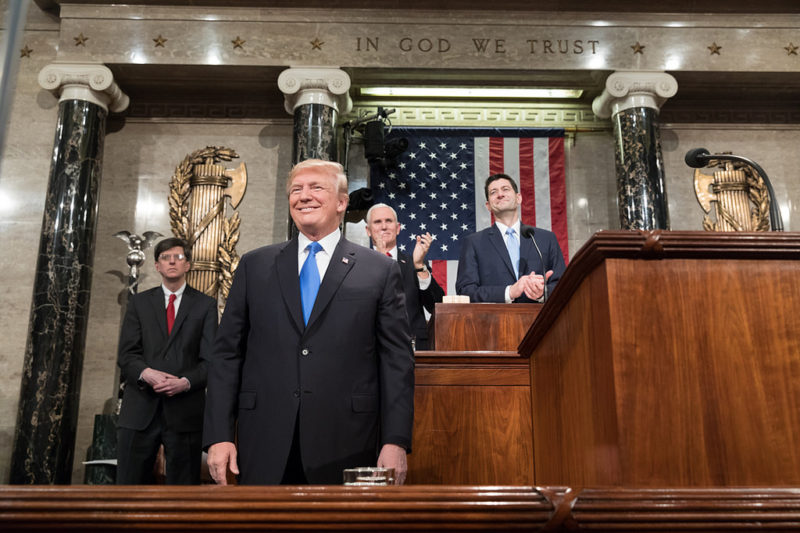Federalism Can Breathe Life into Infrastructure

The Trump administration has indicated its willingness to make a two-pronged change to infrastructure funding: (1) shifting responsibility from federal to state and local governments and (2) shifting some degree of responsibility from government to the private sector. The new plan also scales back onerous environmental requirements and speeds up the process for project approval.
Criticism from progressive economists and journalists has been frenetic. Their argument is simple: Trump wants to privatize infrastructure to complete his devious project of enriching his wealthy corporate friends. In addition, he wants to place the greatest burden on cities and states (already strapped for cash because of their bloated budgets) and limit federal spending to a pitiful $200 billion over the next 10 years. A remaining $1.3 trillion would come from private and state and local funding.
It is no surprise that New York Times columnists and DC bureaucrats are not overjoyed. One of the strong levers of power in the hands of the federal bureaucracy is their ability to leverage funding to states and localities to dictate policy approaches that should be state and local responsibilities. At present, for example, federal funds constitute 50 percent of all transportation capital investment at the state and local levels. The Trump administration plans to reduce that to 20 percent, an obvious diminution of the federal bureaucracy’s influence and power, and they are not happy about it.
The system of federal aid is at the core of the expansion of government across the United States, because it encourages a fiscal illusion, a belief that the costs of projects are borne by non-residents — in other words, by someone else. It relieves local politicians of the need to increase taxes or go into debt to finance their projects. This makes lavish, extravagant, and inefficient spending more attractive and politically viable. The more of this money they get, perceiving it to be at no cost, the more recklessly and more shamelessly they are likely to squander it.
Essentially, this system undermines democratic accountability by allowing politicians to provide their constituencies with an illusion of a fiscal free lunch. Federal government is a distant abstraction, as close as we can get in the world of grownups to Santa Claus. The feds like the system since it justifies increased budgets, power, and prestige, and it permits them to engage in social engineering. State and local politicians like it because it allows them to avoid accountability, to take credit for success and shift the blame for failure. Everybody is happy, except future taxpayers.
Trump threatens to ruin the whole scam. He and his economic advisers may not be big students of American federalism. Yet they stumbled, perhaps on account of their common-sense skepticism toward federal bureaucracy, on something profoundly important: the old federalist idea that whoever raises taxes should be spending the proceeds, and that this should be mostly local and state governments.
That’s an important way to secure accountability. Federal grants and transfers are the techniques of choice used by socialist regulators in all federal countries, because in such countries it’s difficult to impose one-size-fits-all national schemes from the top down. Hence, federal spending power greases the wheels of reform by bribing the population and docile politicians and blackmailing and boxing in politicians skeptical of federal meddling. You don’t want Medicaid expansion? Very well, explain to your voters why you want to withhold the free federal goodies from them. If you do want federal goodies, then you will have to do as you’re told.
This is a universal scam, used in all federal systems. Consider Canada’s health-care system, which American progressives love so much and assume to be a national program. Technically, it is not a national program at all but rather a purportedly federalist scheme along the lines of American infrastructure programs. It’s an Ottawa-orchestrated cartel of provincial programs, regulated, administered, and partially financed by the provinces. All the major features of the programs, however, including its “free at the point of use” requirement, were engineered and dictated by the federal government.
The feds simply said: if you set up a socialist health-care model along the lines of Tommy Douglass’s experiment (the socialist premier of Saskatchewan who pioneered the single-payer model), we will cover 50 percent of your costs. From 1940 to 1970, when the universal single payer system was adopted, the share of federal transfers increased from 8 percent to more than 30 percent of provincial budgets. Even the most ideologically adverse provinces such as Ontario and Alberta quickly succumbed to this offer they could not refuse. If you refused to go along you would then have to explain to voters why they would pay federal taxes for health care and not get the “free” goodies from you.
The level of cartelization in the case of American infrastructure is lower, but the basic principles are the same. The federal government exerts control over the agenda, not through legislative or regulatory takeover, but through financial bribes and blackmails. Now, with the Trump administration easing the level of interference, he threatens to weaken the power of federal government. That is the true and only source of strong resistance from the Democrats and mainstream media towards Trump’s infrastructure plan.
Public-private partnerships that are being touted by the Trump administration are not a panacea, but they could be a useful check on the uncontrolled explosion of government spending in recent years. From the structural and constitutional perspectives, even more important is the revival of classical federalism through reestablishing the crucial link between who raises taxes and who spends the money. The literature on fiscal federalism has shown convincingly that this represents the key factor in limiting the growth of government.
Mere spending decentralization is irrelevant if the central government retains the power to rewards its allies and punish its frugal opponents at the state and local levels through federal grants and transfers. In federal systems, true democratic accountability means limited and frugal government.










